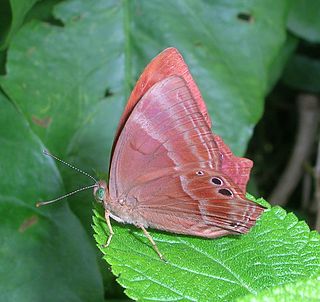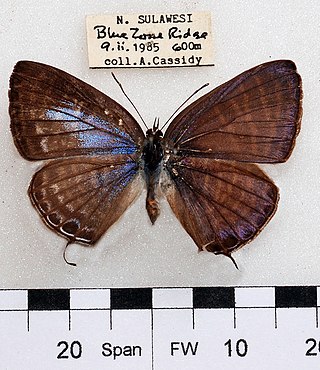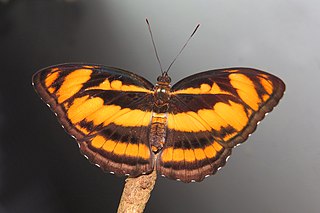
Abisara echerius, the plum Judy, is a small but striking butterfly found in Asia belonging to the Punches and Judies family (Riodinidae). It is difficult to distinguish it from Abisara bifasciata.

Zemeros flegyas, the Punchinello, is a small butterfly found in South Asia and Southeast Asia that belongs to the family Riodinidae.

Abisara neophron, the tailed Judy, is a small but striking butterfly found in India that belongs to the Punches and Judies family (Riodinidae).

Dodona dipoea, the lesser Punch, is a small but striking butterfly found in the Indomalayan realm that belongs to the Punches and Judies, that is, the family Riodinidae.

Dodona ouida, the mixed Punch, is a small but striking butterfly found in the Indomalayan realm in West China, Himalayas, Northeast India (hills) and Burma that belongs to the Punches and Judies, that is, the family Riodinidae.

Colotis vestalis, the white Arab, is a small butterfly of the family Pieridae, that is, the yellows and whites, which is found in India, Pakistan, Iran, Somalia, Ethiopia, Sudan, Kenya and Tanzania. It has a wingspan of 4–5 cm.

Colotis fausta, the large salmon Arab, is a small butterfly of the family Pieridae, that is, the yellows and whites, which is found in Israel, Syria, Turkey, Iran, Afghanistan, Turkmenistan, India, Arabia, Chad, Somalia and United Arab Emirates.

Cepora nadina, the lesser gull, is a small to medium-sized butterfly of the family Pieridae, that is, the yellows and whites. The species was first described by Hippolyte Lucas in 1852. It is native to Sri Lanka, India, Myanmar, Hainan, and southeast Asia.

Azanus jesous, the African babul blue or topaz-spotted blue, is a small butterfly found in Africa, Egypt, Syria, India, Sri Lanka and Myanmar that belongs to the lycaenids or blues family.

Chilades lajus, the lime blue, is a small butterfly found in India, Sri Lanka, Myanmar, Taiwan, Hong Kong, Hainan, Mangulam Island, Sulawesi and the Philippines that belongs to the lycaenids or blues family.

Jamides bochus, the dark cerulean, is a small butterfly found in Indomalayan realm that belongs to the lycaenids or blues family. The species was first described by Caspar Stoll in 1782.

Jamides celeno, the common cerulean, is a small butterfly found in Indomalayan realm belonging to the lycaenids or blues family. The species was first described by Pieter Cramer in 1775.

Jamides kankena, the glistening cerulean, is a small butterfly found in India that belongs to the lycaenids or blues family.

Curetis bulis, the bright sunbeam, is a species of butterfly belonging to the lycaenid family. It is found in Asia.

Nacaduba pactolus, the large four-line blue, is a species of lycaenid butterfly found in Indomalayan realm.

Petrelaea dana, the dingy lineblue, is a species of lycaenid butterfly found in Indomalayan realm.

Nacaduba hermus, the pale four-line blue, is a species of lycaenid butterfly found in Indomalayan realm. The species was first described by Baron Cajetan von Felder in 1860.

Athyma nefte, the colour sergeant, is a species of brush-footed butterfly found in tropical South and Southeast Asia.

Athyma zeroca, the small staff sergeant, is a species of nymphalid butterfly found in tropical and subtropical Asia.

Vindula erota, the common cruiser, is a species of nymphalid butterfly found in forested areas of tropical South Asia and Southeast Asia.





















